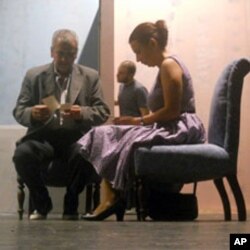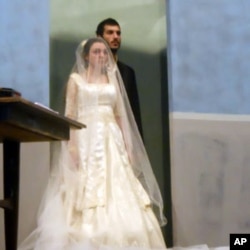Lebanon is home to more than 400,000 Palestinians, many are second, third and fourth generation refugees that fled the Arab-Israeli wars in 1948 and 1967. On Saturday, a Beirut theater company performed Return to Haifa, a play about a Palestinian couple visiting their old home in Israel, and finding the son they abandoned raised an Israeli.
In Return to Haifa, characters Sa'id and Safia evacuated their home by force during the 1948 Arab-Israeli war, abandoning their baby. Twenty years later, Israel wins the Six Day War, and the borders are opened. Like many Palestinian families, Sa'id and Safia travel to Haifa, once their home, now an Israeli city.
In Haifa they find their house is now home to Miriam, a Jewish World War II refugee, and the adopted mother of Dov, the son they abandoned. Dov was raised Jewish, and is now an Israeli soldier. Dov, played by Hussein Nakhal, blames his parents for leaving him and insults Arabs in general.
"Twenty years have passed sir. Twenty years! What did you do during that time? What did you do to bring your son back? You are all impotent. You are ignorant," he says.
The play opened on Saturday to commemorate the 62nd anniversary of the passing of U.N. Resolution 194 which promises all refugees, Jewish and Palestinian, the right to return to their homes or be compensated for their properties. Much of the non-binding resolution was never implemented and Palestinians have now suffered the world's longest refugee crisis.
The story was written by celebrated Palestinian author the late Ghassan Kanafani. But audience members say in this story, everyone is a victim, including the Israeli family living in the once-Palestinian home. In this story, everyone is also at least partially responsible for their own fates.
After the show, Arab-American professor Laila Farah, of DePaul University in the United States, says the story resonates deeply among Arabs in the Middle East.
"The Palestinian issue is the heart of all of the conflict in this region and people take it very personally, whether it is support of or being against," said Farah.
In Lebanon, Palestinians live on the margins of society, mostly in camps, without the right to vote, own property and work in many professions. Even though most were born and raised in Lebanon, they are considered foreigners and can rarely work outside of the refugee camps, where 60 percent of the people are unemployed or underemployed.
Many Palestinians in Lebanon say gaining basic civil rights in the country they live in is more important, and more realistic, than having the right to return to their homeland. Many Lebanese people say Palestinians should not be given civil rights in Lebanon because they may lose the motivation to return to their homeland, but actor Hussein Nakhal, who plays the son, says Palestinians will never stop wanting to return.
"If you have your civil rights, it will not change your essence," said Nakhal. "The essence is to return home."
Audience members say Return to Haifa also explores the nature of identity and asks the question of whether a person is who they born to be or who they were raised to be. American University in Beirut Professor Robert Myers says the play created a world that allowed the audience to examine the question.
"Was he or is he still their son? It is a real interesting question," he said. "Because is genetics destiny? It is a question that we live with now."
Myers says, for a Palestinian child raised by Israeli parents, there is no easy answer.






